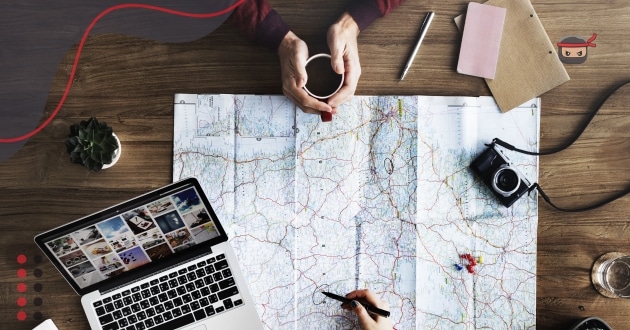Traveling is one of the best experiences in life. However, if you are not careful, you can quickly get into debt. However, you can learn how to save for a vacation without compromising your financial life.
The key is to understand your budget, make conscious cuts, and adopt strategies that allow you to accumulate resources month after month.
Keep reading and learn all the tips on how to save for a vacation, making it easy to travel wherever you want, saving up to 60% in some cases. Let’s go.
05 Stages How to Save for a Vacation
1. Know how much you’re spending

Before you think about buying tickets or booking hotels, you should have a clear picture of your finances.
Therefore, understanding exactly how you use your money monthly is the first step to planning a trip without compromising your financial stability
Start by recording all of your sources of income, and then list your spending over a 30-day period in detail.
With this analysis, you will be able to identify patterns, cut excesses and allocate a part of your money exclusively for the trip, with much more awareness and security.
After all, well-done financial planning is what turns a travel dream into an achievable reality without debts in the luggage.
2. Organize accounts by categories (How to Save for a Vacation)
Once you’ve recorded all of your income and expenses, the next step is to categorize your expenses. This will help you visualize more clearly where your money is being directed.
In addition, identify which expenses can be adjusted to make room in the budget for your trip. Start by dividing your accounts into fixed and variable:
- Fixed expenses are those that remain the same every month and are difficult to reduce in the short term;
- Variable expenses include all expenses that can be adjusted or even eliminated. This includes clothing purchases, food away from home, streaming subscriptions such as Netflix or Spotify, delivery expenses, among others.
Separating expenses in this way will show you where the excesses are and help you make more conscious decisions. And the best: it will allow you to direct part of this amount to a travel fund, planning with more responsibility and realism.
You can even use personal loans for self employed to be able to organize your finances with peace of mind.
3. Reduce expenses
Once you’ve identified your variable expenses, it’s time to take action to reduce them.
One of the first areas to review is food. Small practices such as
- Plan your meals in advance;
- Buy items in larger quantities;
- Avoid going to the supermarket hungry.
These are simple attitudes that help you stay in control and avoid impulsive purchases. With a weekly meal plan, it’s easy to reduce waste and you can better estimate how much you’ll spend each week.
Another easy measure to apply is to review all the subscription services you are linked to.
We often maintain active subscriptions that we don’t even use anymore, streaming apps, digital magazines, fitness services, and others.
By canceling them, the amount saved can be directed to your travel fund. Likewise, it is worth reevaluating your cell phone plan: switching to a cheaper and more functional option is a smart decision.
4. Get a second job (How to Save for a Vacation)
If your goal is to accelerate the economy for a trip or other goal, looking for a second source of income can be a quick fix.
Side jobs, such as freelancing in your area of expertise, shifts in restaurants, delivery services or even selling products online, are viable alternatives to supplement the budget.
The key is to see this journey as something temporary and purposeful. Thus, he is dedicating extra time now to achieve something greater in the future.
However, you must maintain balance. If the extra work affects your mental or physical health, it’s best to rethink your goals and adjust the pace.
5. Shop Prices to Save

Always compare prices in advance. This way, you can save a lot of money. Keep reading and understand how to save fast.
Understand how to buy tickets spending less
Saving on the purchase of airline tickets requires planning and strategy.
Prices vary, even within the same day. An efficient tip is to use websites and apps that compare prices and send alerts when tickets to your destination drop in value.
Another important point is timing. Buying in advance makes you find better prices. Especially in periods of high demand. In addition, flights at off-peak times, such as early in the morning or during the early morning, are cheaper.
Stay in amazing places on a budget (How to Save for a Vacation)
Finding comfortable accommodation without breaking the bank is easy, when done right. In fact, you just need to know where to look and how to choose.
Many hotels offer special rates and free upgrades to members of their loyalty programs. If you intend to travel frequently, it is worth staying loyal to a single network, accumulating points that can be exchanged for free nights or exclusive benefits.
When traveling in a group, opting for larger house or suite rentals can be cheaper than booking multiple hotel rooms.
Another strategic point is the location. Although staying in the center of big cities seems more convenient, looking for accommodation in nearby neighborhoods, a few kilometers from the main tourist attractions will save you a lot of money.
Rent cars the right way
Renting a car is not always the most economical option, it all depends on the destination, the duration of the trip and the local transport structure.
In large cities or tourist destinations with a good supply of public transport or on-demand transport apps, such as Uber or Lyft, we recommend that you use these means of transportation.
On the other hand, in regions where public transport is limited or where you plan to visit several remote points, renting a car can bring more freedom and practicality.
In this case, the ideal is to book in advance, as prices vary according to demand and availability of vehicles.
Conclusion
Learning how to save for a vacation is more than just saving money, it’s about creating a smart and realistic plan to achieve your dream of traveling.
As we have seen, by understanding your finances, reducing unnecessary expenses, exploring new sources of income, and comparing prices in advance, it is possible to organize a trip without compromising your financial stability.
In fact, with small changes in habits and more conscious choices, you will be closer to exploring new destinations, enjoying incredible experiences with tranquility and safety. Start applying these strategies today and turn your plans into reality, with savings and freedom.

